英语助动词和情态动词及练习
- 格式:doc
- 大小:154.50 KB
- 文档页数:16
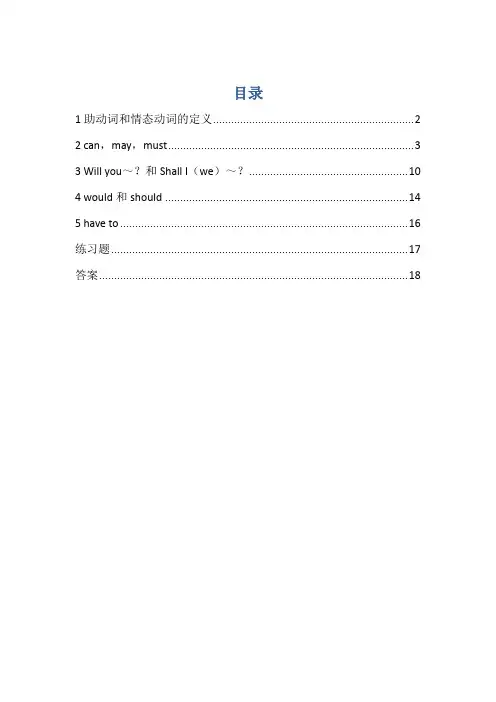
目录1助动词和情态动词的定义 (2)2 can,may,must (3)3 Will you~?和Shall I(we)~? (10)4 would和should (14)5 have to (16)练习题 (17)答案 (18)1助动词和情态动词的定义在英语中,助动词一般没有词义,主要帮助构成谓语,表示时态、语态或构成疑问及否定形式。
对于助动词,同学们一般了解即可。
情态动词与助动词不同,它有词义,但它也和助动词一样,不能单独作谓语,它必须和其他动词一起构成谓语,另外重要的一点是情态动词没有人称和数的变化;情态动词后必须跟动词原形。
(×)She cans swim well. (×)She can swims well.(○)She can swim well. (○)She swims well.即使主语是第三人称单数(例如she)can也不能加“s”。
句子中有情态动词can时,即使主语是第三人称单数,也不能在一般动词(例如swim)上加“s”。
1 助动词的种类1.be(am,are,is,was,were,been,being)它与现在分词结合,可以构成进行时态(参见第九章),与过去分词结合可以构成被动语态(参见第十三章)。
I am reading the book.我正在读这本书。
The book was written by me.这本书是我写的。
2. have(has,had,having)它与过去分词结合,构成完成时态(参见第十一章)。
I have finished my homework.我已经写完作业了。
3.shall(should),will(would)它与动词结合构成将来时(参见第十章)。
I will visit Beijing tomorrow.我明天将到北京参观。
4. do(does,did)它与其他动词结合构成否定句和疑问句(参见第六、七、八、十九章)。
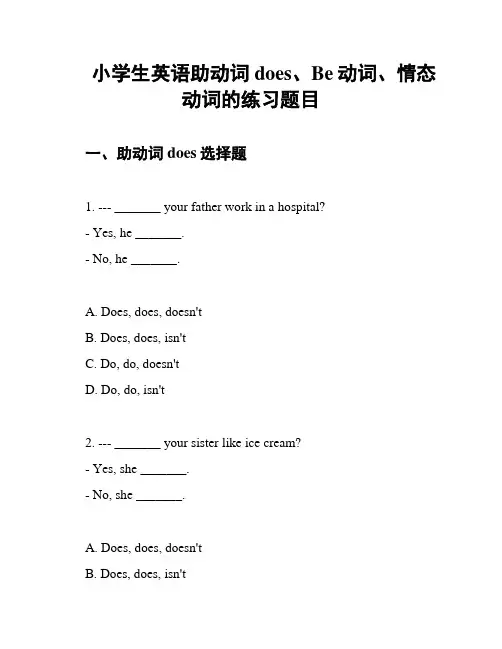
小学生英语助动词does、Be动词、情态动词的练习题目一、助动词does选择题1. --- _______ your father work in a hospital?- Yes, he _______.- No, he _______.A. Does, does, doesn'tB. Does, does, isn'tC. Do, do, doesn'tD. Do, do, isn't2. --- _______ your sister like ice cream?- Yes, she _______.- No, she _______.A. Does, does, doesn'tB. Does, does, isn'tC. Do, do, doesn'tD. Do, do, isn't3. --- _______ they watch TV every evening? - Yes, they _______.- No, they _______.A. Do, do, doesn'tB. Do, do, aren'tC. Does, does, doesn'tD. Does, does, isn't4. --- _______ you play football after school? - Yes, I _______.- No, I _______.A. Do, do, doesn'tB. Do, do, aren'tC. Does, does, doesn'tD. Does, does, isn't5. --- _______ Wendy have a pet dog?- Yes, she _______.- No, she _______.A. Does, does, doesn'tB. Does, does, isn'tC. Do, do, doesn'tD. Do, do, isn't二、Be动词填空题1. Tony _______ a student. He _______ in Grade 4.2. We _______ brothers. _______ names are John and Mike.3. She _______ a doctor. She _______ at a hospital.4. I _______ a teacher. I _______ English.5. They _______ my friends. _______ names are Tom and Sarah.三、情态动词选择题1. You _______ pack your bag before you go to school.A. mustB. canC. shouldD. would2. He _______ swim very well when he was young.A. canB. mayC. willD. could3. _______ I have a piece of cake?A. MayB. CanC. CouldD. Should4. You _______ eat vegetables for a healthy diet.A. mustB. canC. willD. have to5. She _______ play the piano when she was five years old.A. mustB. canC. couldD. should。
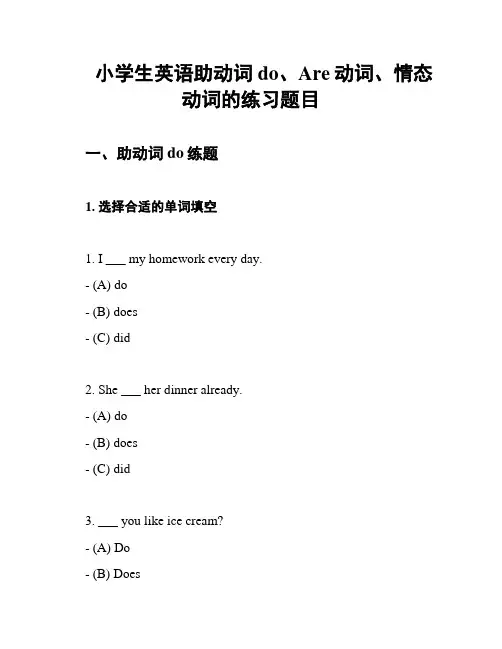
小学生英语助动词do、Are动词、情态动词的练习题目一、助动词do练题1. 选择合适的单词填空1. I ___ my homework every day.- (A) do- (B) does- (C) did2. She ___ her dinner already.- (A) do- (B) does- (C) did3. ___ you like ice cream?- (A) Do- (B) Does- (C) Did2. 句子改写将下列句子改写为否定句和疑问句。
1. He eats breakfast every morning.- 否定句: He ___ ___ breakfast every morning.- 疑问句: ___ he eat breakfast every morning?2. She helps her friends with their homework.- 否定句: She ___ ___ her friends with their homework. - 疑问句: ___ she help her friends with their homework?二、Are动词练题1. 选择合适的单词填空1. They ___ playing soccer in the park.- (A) is- (B) am- (C) are2. ___ your parents at home?- (A) Is- (B) Am- (C) Are3. We ___ going to the movies tonight. - (A) is- (B) am- (C) are2. 根据所给单词填空完成句子1. I ___ a student.2. She ___ a doctor.3. They ___ brothers and sisters.三、情态动词练题1. 选择合适的情态动词填空1. I ___ play the guitar.- (A) can- (B) do- (C) am2. You ___ help your mother with the housework. - (A) can- (B) do- (C) am3. He ___ swim very well.- (A) can- (B) does- (C) is2. 句子改写将下列句子用合适的情态动词或助动词完成。
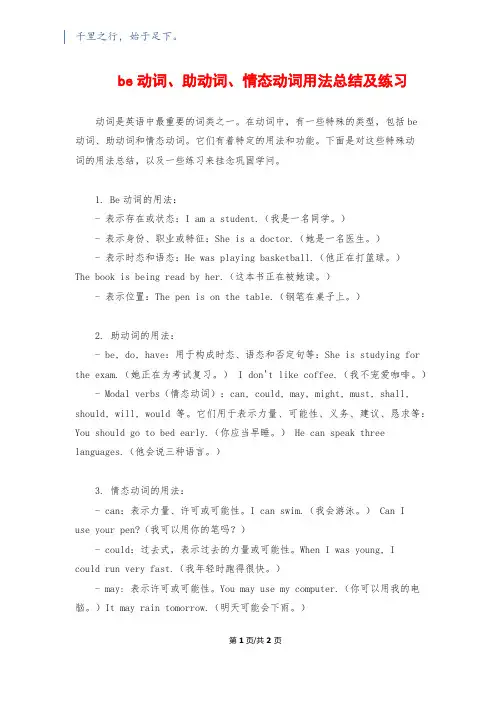
千里之行,始于足下。
be动词、助动词、情态动词用法总结及练习动词是英语中最重要的词类之一。
在动词中,有一些特殊的类型,包括be动词、助动词和情态动词。
它们有着特定的用法和功能。
下面是对这些特殊动词的用法总结,以及一些练习来挂念巩固学问。
1. Be动词的用法:- 表示存在或状态:I am a student.(我是一名同学。
)- 表示身份、职业或特征:She is a doctor.(她是一名医生。
)- 表示时态和语态:He was playing basketball.(他正在打篮球。
)The book is being read by her.(这本书正在被她读。
)- 表示位置:The pen is on the table.(钢笔在桌子上。
)2. 助动词的用法:- be, do, have:用于构成时态、语态和否定句等:She is studying for the exam.(她正在为考试复习。
) I don't like coffee.(我不宠爱咖啡。
)- Modal verbs(情态动词):can, could, may, might, must, shall, should, will, would等。
它们用于表示力量、可能性、义务、建议、恳求等:You should go to bed early.(你应当早睡。
) He can speak three languages.(他会说三种语言。
)3. 情态动词的用法:- can:表示力量、许可或可能性。
I can swim.(我会游泳。
) Can Iuse your pen?(我可以用你的笔吗?)- could:过去式,表示过去的力量或可能性。
When I was young, Icould run very fast.(我年轻时跑得很快。
)- may: 表示许可或可能性。
You may use my computer.(你可以用我的电脑。
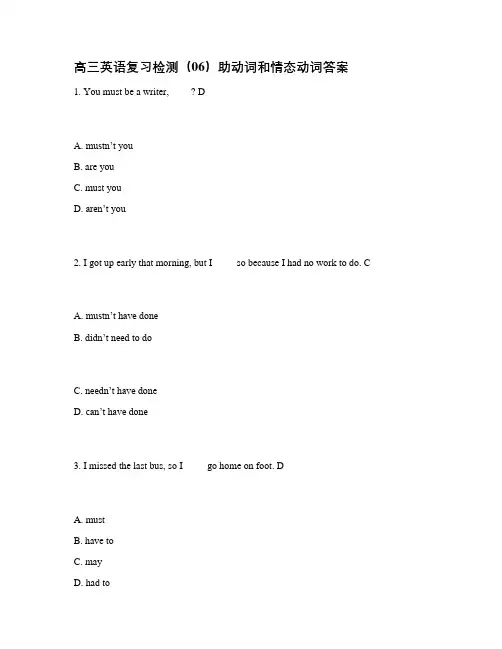
高三英语复习检测(06)助动词和情态动词答案1. You must be a writer, ____? DA. mustn’t youB. are youC. must youD. aren’t you2. I got up early that morning, but I ____ so because I had no work to do. CA. mustn’t have doneB. didn’t need to doC. needn’t have don eD. can’t have done3. I missed the last bus, so I ____ go home on foot. DA. mustB. have toC. mayD. had to4. -- Please don’t make a noise.` B-- ____. I’ll be as quiet as a mouse.A. Yes, I won’tB. No, I won’tC. No, I willD. Yes, I will5. One ought ____ for what one hasn’t done. AA. not to be punishedB. to not be punishedC. to not punishedD. not be punished6. Let’s clean our classroom, ____? CA. will youB. don’t weC. shall weD. do you7. Let us play basketball, ____? AA. will youB. don’t weC. shall weD. do you8. -- There were already five people in the car but they managed to take me as well. -- It ____ a comfortable journey. DA. can’t beB. shouldn’t beC. mustn’t have beenD. couldn’t have been9. -- May I stop here?-- No, you ____. ` AA. mustn’tB. might notC. needn’tD. won’t10. The plant is dead. I ____ it more water. DA. will giveB. would have givenC. must giveD. should have given11. You ____ return the book now. You can keep it till next week if you like. CA. can’tB. mustn’tC. needn’tD. may not12. The little girl ____ there alone. CA. not dare goB. dares not goC. dare not goD. dare not to go13. Without his help, we ____ such rapid progress. BA. do n’t makeB. would not makeC. didn’t makeD. would not have made14. A computer ____ think for itself; it must be told what to do. (NMET 1991 AA. can’tB. couldn’tC. may notD. might not15. -- Could I borrow your dictionary? (NMET 1992--Yes, of course you ____. CA. mightB. willC. canD. should16. -- Shall we go skating or stay at home?-- Which ____ do yourself? (NMET 1992 BA. do you ratherB. would you ratherC. will you ratherD. should you rather17. Tom ought not to ____ me your secret, but he meant no harm. (NMET 1993 AA. have toldB. tellC. by tellingD. having told18. Peter ____ come with us tonight, but he isn’t very sure yet. (NMET 1993 BA. mustB. mayC. canD. will19. -- Shall I tell John about it? (NMET 1994-- No, you ____. I’ve told him already. AA. needn’tB. wouldn’tC. mustn’tD. shouldn’t20. -- Don’t forget to come to my birthday party tomorrow. (NMET 1994-- ____. BA. I don’tB. I won’tC. I can’tD. I haven’t21. --There were already five people in the car but they managed to take me as well. -- It ____ a comfortable journey. (NEMT 1995 DA. can’t beB. shouldn’t beC. mustn’t have beenD. couldn’t have been22. It’s already seven o’clock. Jack ____ be here at any moment. (NEMT 1995 CA. mustB. needC. shouldD. can23. Johnny, you ____ play with the knife, you ____ hurt yourself. (NMET 1996 BA. won’t; can’tB. mustn’t; mayC. shouldn’t; mustD. can’t; shouldn’t24. The fire spread through the hotel very quickly but everyone ____ get out. (NEMT 1997 DA. had toB. wouldC. couldD. was able to25. -- When can I come for the photos? I need them tomorrow afternoon. (NMET 1998 --They ____ be ready by 12:00. BA. canB. shouldC. mightD. need26. -- I stayed at a hotel while in New York. (NMET 1998-- Oh, did you? You ____ with Barbara. AA. could have stayedB. could stayC. would stayD. must have stayed27. -- Will you stay for lunch? (NEMT 1999-- Sorry, ____. My brother is coming to see me. BA. I mustn’tB. I can’tC. I needn’tD. I won’t28. -- Are you coming to Jeff’s party? (NEMT 2000-- I’m not sure. I ____ go to the concert instead. DA. mustB. wouldC. shouldD. might29. -- Is John coming by train? (NEMT 2002-- He should, but he ____ not. He likes driving his car. DA. mustB. canC. needD. may30. -- I heard they went skiing in the mountains last winter. (北京 2002-- It ____ true because there was little snow there. CA. may not beB. won’t beC. couldn’t beD. mustn’t be31. A left-luggage office is a place where bags ____ be left for a short time, especially ata railway station. (NEMT 2003 BA. shouldB. canC. mustD. will32. I often see lights in the empty house. Do you think I _____ report it to police? (04广西 AA. shouldB. mayC. willD. can33. How ____ you say that you really understand the whole story if you have covered only part of the article? (上海 2003 AA. canB. mustC. needD. may34. You ____ be tired –you’ve only been working for an hour. (04吉林 CA. must notB. won’tC. can’tD. may not35. I’ve lost one of my gloves. I ____ it somewhere. (05北京 BA. must dropB. must have droppedC. must be droppingD. must have been dropped。
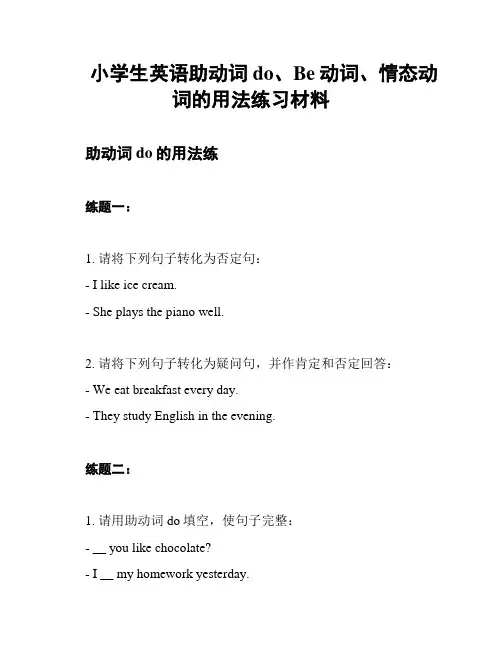
小学生英语助动词do、Be动词、情态动词的用法练习材料助动词do的用法练练题一:1. 请将下列句子转化为否定句:- I like ice cream.- She plays the piano well.2. 请将下列句子转化为疑问句,并作肯定和否定回答:- We eat breakfast every day.- They study English in the evening.练题二:1. 请用助动词do填空,使句子完整:- __ you like chocolate?- I __ my homework yesterday.2. 请用助动词do回答下列问题:- __ you have a pet?- __ you wash the dishes after dinner?Be动词的用法练练题一:1. 请根据下列句子选择正确的Be动词形式填空:- I __ a student.- She __ my best friend.2. 请根据下列情景,回答相应的问题:- Q: What is your favorite color?A: __练题二:1. 请将下列句子改为否定句:- They are playing soccer.- He is eating lunch.2. 请将下列句子改为一般疑问句,并作肯定和否定回答:- You are a student.- She is singing a song.情态动词的用法练练题一:1. 请根据下列情景,选择合适的情态动词填空:- _______ I go to the bathroom?- We _______ eat fruits and vegetables.2. 请用情态动词can改写下列句子:- I am able to swim.- They are able to finish the project.练题二:1. 请将下列句子改为否定句:- She must go to school.- He should eat vegetables.2. 请将下列句子改为一般疑问句,并作肯定和否定回答:- We can play basketball.- You should study for the test.以上是关于小学生英语助动词do、Be动词、情态动词的用法练习材料,希望能帮到你!。
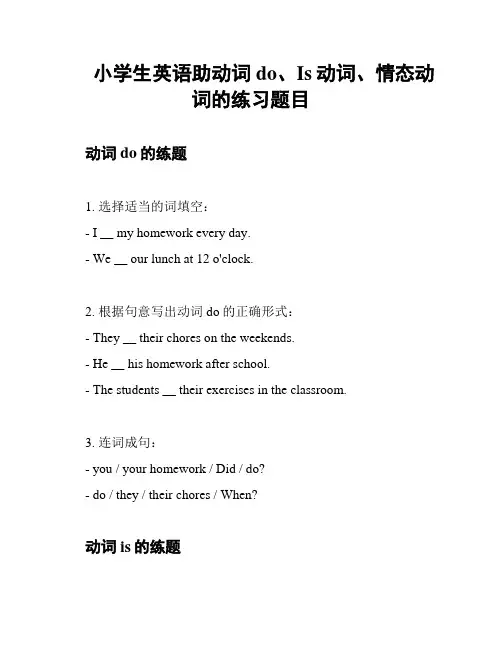
小学生英语助动词do、Is动词、情态动词的练习题目动词do的练题1. 选择适当的词填空:- I __ my homework every day.- We __ our lunch at 12 o'clock.2. 根据句意写出动词do的正确形式:- They __ their chores on the weekends.- He __ his homework after school.- The students __ their exercises in the classroom.3. 连词成句:- you / your homework / Did / do?- do / they / their chores / When?动词is的练题1. 填入is或is not:- She __ happy.- They __ at home.- It __ a cat.2. 根据句意填入动词is的正确形式:- The dog __ in the garden.- The flowers __ beautiful.- This book __ mine.3. 连词成句:- is / it / What?- happy / you / Are?情态动词的练题1. 选择适当的情态动词填空:- I __ go to the park with you.- You __ eat too much candy.- He __ play the piano very well.2. 根据句意填入合适的情态动词:- __ I use your pencil?- She __ speak French fluently.3. 连词成句:- can / Can / swim / you?- must / We / study / hard.以上是关于小学生英语助动词do、Is动词、情态动词的练题目。
请根据题目要求填写正确答案,并通过练提高语言能力和理解能力。
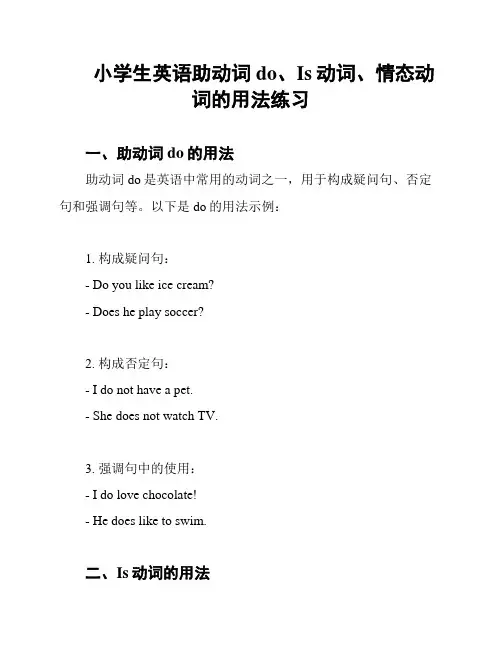
小学生英语助动词do、Is动词、情态动词的用法练习一、助动词do的用法助动词do是英语中常用的动词之一,用于构成疑问句、否定句和强调句等。
以下是do的用法示例:1. 构成疑问句:- Do you like ice cream?- Does he play soccer?2. 构成否定句:- I do not have a pet.- She does not watch TV.3. 强调句中的使用:- I do love chocolate!- He does like to swim.二、Is动词的用法Is动词是be动词的第三人称单数形式,常用于描述第三人称单数的状态和特征。
下面是is的用法示例:1. 描述第三人称单数的状态和特征:- She is a doctor.- He is tall and handsome.2. 表示存在:- There is a book on the table.- There is a cat in the garden.三、情态动词的用法情态动词(Modal Verbs)在英语中表达情态、推测、可能性、许可和能力等意义。
常见的情态动词包括can、could、may、might、shall、should、will、would、must等。
以下是情态动词的用法示例:1. 表示能力与许可:- Can I go to the restroom?- You must finish your homework.2. 表示推测和可能性:- It may rain tomorrow.- They might arrive late.3. 表示建议和义务:- You should eat more vegetables.- We must be on time for the meeting.请根据上述用法示例,完成下面的练题。
练题:根据句意,选择适当的助动词do、Is动词或情态动词填空。
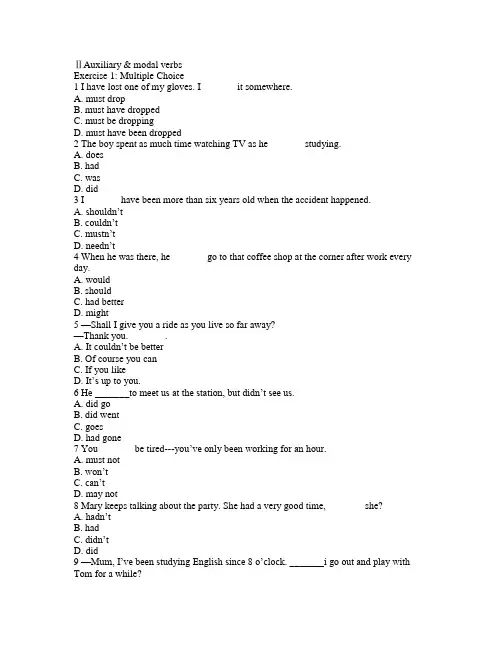
ⅡAuxiliary & modal verbsExercise 1: Multiple Choice1 I have lost one of my gloves. I _______it somewhere.A. must dropB. must have droppedC. must be droppingD. must have been dropped2 The boy spent as much time watching TV as he _______studying.A. doesB. hadC. wasD. did3 I _______have been more than six years old when the accident happened.A. shouldn’tB. couldn’tC. mustn’tD. needn’t4 When he was there, he _______go to that coffee shop at the corner after work every day.A. wouldB. shouldC. had betterD. might5 —Shall I give you a ride as you live so far away?—Thank you. _______.A. It couldn’t be betterB. Of course you canC. If you likeD. It’s up to you.6 He _______to meet us at the station, but didn’t see us.A. did goB. did wentC. goesD. had gone7 You _______be tired---you’ve only been working for an hour.A. must notB. won’tC. can’tD. may not8 Mary keeps talking about the party. She had a very good time, _______ she?A. hadn’tB. hadC. didn’tD. did9 —Mum, I’ve been studying English since 8 o’clock. _______i go out and play with Tom for a while?—No, I’m afraid not. Besides, It’s raining outside now.A. Can’tB. Wouldn’tC. May notD. Won’t10 It’s wonderful that you _______have achieved so much in these years.A. mayB. canC. shouldD. would11 I _______pay Tracy a visit, but I’m not sure whether I will have time this Saturday.A. shouldB. mightC. wouldD. could12 I’d be glad if you _______give me an account of the fact.A. shallB. shouldC. wouldD. may13 —Isn’t that Ann’s husband over there?—No, it _______be him—I’m sure he doesn’t wear glasses.A. can’tB. must notC. won’tD. may not14 You might just as well tell the manufacturer that male customers _______not like the design of the furniture.A. mustB. shallC. mayD. need15 How _______you say you really understand the whole story if you have covered only part of the article?A. canB. mustC. needD. may16—Why! I _______get you on the phone.—We _______basketball on the playground when you phoned.A. didn’t; must be playingB. couldn’t; must be playingC. couldn’t; must have playedD. didn’t/must have been playing17 Often, when he _______something that _______him, he wasted his time drawing some little pictures.A. should be doing; gaveB. should have been doing; was givenC. should do; was givenD. should have been doing; had given18 If I ever decided to quit, then nothing my parents or my coaches ___________say_________change my mind. It’s my life, not theirs.A. could; wouldB. could; shouldC. would; mustD. would; should19 Jenny _______with him at that time, for I was having dinner with her in my home.A. can’t have beenB. mustn’t have beenC. must have beenD. may have been20 —Who _______it be at this hour of a day?A. mayB. canC. mustD. should21 —Who told you the news?—I don’t remember clearly. It _______Mary.—It _______Mary. She doesn’t know it.A. may have been; can’t beB. can be; mustn’t beC. must have been; can’t have beenD. may have been; may not be22 He _______have completed his work, otherwise, he wouldn’t be enjoying himself by the seaside.A. shouldB. mustC. wouldn’tD. can’t23 Some aspects of a pilot’s job_______be boring, and pilots often _______work at inconvenient hours.A. can; have toB. may; canC. have to; mayD. ought to; must24 As you worked late yesterday, you _______have come this morning.A. needn’tB. mayn’tC. can’tD. mustn’t25 Research findings show we spend about two hours dreaming every night, no matter what we _______during the day.A. should have doneB. would have doneC. may have doneD. must have done26 Tom, you _______leave all your clothes on the floor like this.A. wouldn’tB. mustn’tC. needn’tD. may not27 My sister met him at the Grand Theatre yesterday afternoon, so he_______your lecture.A. could n’t have attendedB. needn’t have attendedC. mustn’t have attendedD. shouldn’t have attended28 If I _______plan to do anything I wanted to, I’d like to go to travel as much as possible.A. wouldB. couldC. has toD. ought to29 —The woman biologist stayed in Africa studying wild animals for 13 years before she returned.—Oh, dear! She _______a lot of difficulties.A. may go throughB. might go throughC. ought to have gone throughD. must have gone through30 Mr. White _______at 8:30 for the meeting, bu t he didn’t show up.A. should have arrivedB. should arriveC. should have had arrivedD. should be arriving31 ----Do you know where David is? I couldn’t find him anywhere.----Well. He _____ have gone far---his coat’s still here.A. shouldn’tB. mustn’tC. can’tD. wouldn’t32 There was a lot of fun at yesterday’s party. You _____ come, but why didn’t you?A. must haveB. shouldC. need haveD. ought to have33 —I don’t mind telling you what I know.—You _______. I’m not asking for it.A. mustn’tB. may notC. cantD. needn’t34 Mary _______my letter; otherwise she would have replied before now.A. has receivedB. ought to have receivedC. couldn’t have receivedD. shouldn’t have received35 Carey didn’t go to the party last night because she _______the b aby for her sister until 9:30.A. must have looked afterB. would have to look afterC. had to look afterD. should have looked after36 My pain _______ apparent the moment I walked into the room, for the first man I met asked sympathetically: “Are you fee lingall right?”A. must beB. hadC. must have beenD. had to be37 As it turned out to be a small house party, we _______ so formally.A. needn’t dress upB. did not need have dressed upC. did not need dress upD. needn’t have dressed up38 The World Wide Web is sometimes jokingly called the World Wide Wait because it _____ be very slow.A. shouldB. mustC. willD. can39 Mary is very late, she _____.A. may miss her trainB. may have missed her trai nC. must miss her trainD. could miss her train40 —I’ll tell Mary about her new job tomorrow.—You _______her last week.A. ought to tellB. would have toldC. must tellD. should have told41 Some women _______a good salary in a job instead of staying home, but they decide not to work for the sake of the family.A. must makeB. should have madeC. would makeD. could have made42 You can’t imagine that a well-behaved gentleman _____ be so rude to a lady.A. mightB. needC. shouldD. would43 How _____ you say that you really understand the whole story if you have covered only part of the article?A. canB. mustC. needD. may44 I was on the highway when this car went past followed by a police car. They _____ at least 150 kilometers an hour.A. should have been doingB. must have been doingC. could have doneD. would have done45 The weather turned out to be fine yesterday. I _____ the trouble to carry my umbrella with me.A. should have takenB. could have takenC. needn’t have takenD. mustn’t have taken46 There __________ be any difficulty about passing the road test since you have practiced a lot in the driving school.A. mustn’tB. shan’tC. shouldn’tD. needn’t47 Tom, you _____leave all your clothes on the floor like this!A. wouldn’tB. mustn’tC. needn’tD. may not48 A left-luggage office is a place where bags ____ be left for a short time, especially at a railway station.A. shouldB. canC. mustD. will49 He paid for a seat, when he ______ have entered free.A. couldB. wouldC. mustD. need50 Has it been warned that all the children in this area ____ stay at their homes until the Bird Flu has been controlled?A. canB. willC. mayD. shallExercise 2: Error-Correction1 That small country at one time must be prosperous, for it enjoyed a high level of civilization.2 In a way I agree with you, but I think you could present your argument in a much better way.3 I regret having left the work unfinished I should plan everything ahead carefully4 A piece of evidence shows that life may exist on earth ago.5 I got up early but I didn't need to do so, because I had no work to do that morning.6 He knew that she mustn't have taken the book as she hadn't been in the house at that time.7 Tom has been knocked down by a car. He shouldn’t run across the street without looking around, you8 Judging by the noise that is coming from their room, I think that they must have a party.9 No statement was issued after yesterday’s talk, but it is thought that the two parties might be reaching an agreement.10 She mustn’t have been to Shanghai for business trip for I c ame across him in company half an hour ago. Exercise 3: Translate the following sentences into English1 电话正在响,但是没人接听。
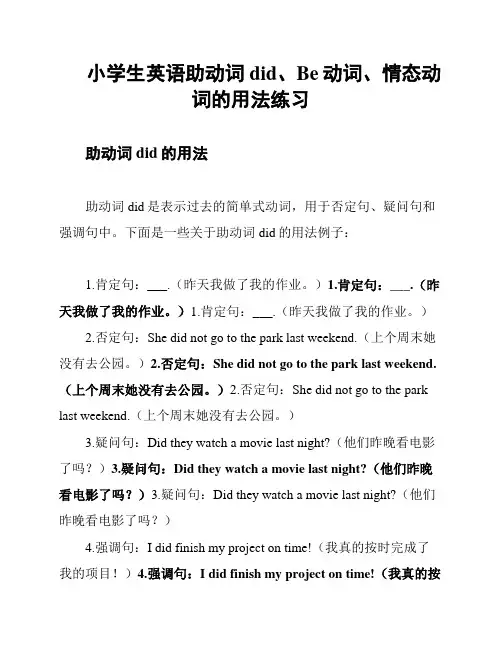
小学生英语助动词did、Be动词、情态动词的用法练习助动词did的用法助动词did是表示过去的简单式动词,用于否定句、疑问句和强调句中。
下面是一些关于助动词did的用法例子:1.肯定句:___.(昨天我做了我的作业。
)1.肯定句:___.(昨天我做了我的作业。
)1.肯定句:___.(昨天我做了我的作业。
)2.否定句:She did not go to the park last weekend.(上个周末她没有去公园。
)2.否定句:She did not go to the park last weekend.(上个周末她没有去公园。
)2.否定句:She did not go to the park last weekend.(上个周末她没有去公园。
)3.疑问句:Did they watch a movie last night?(他们昨晚看电影了吗?)3.疑问句:Did they watch a movie last night?(他们昨晚看电影了吗?)3.疑问句:Did they watch a movie last night?(他们昨晚看电影了吗?)4.强调句:I did finish my project on time!(我真的按时完成了我的项目!)4.强调句:I did finish my project on time!(我真的按时完成了我的项目!)4.强调句:I did finish my project on time!(我真的按时完成了我的项目!)Be动词的用法Be动词是表示状态、性质、身份和存在等的动词,包括am、is、are、was和were。
下面是一些关于Be动词的用法例子:1.肯定句:___ a ___.(他是一名老师。
)1.肯定句:___ a ___.(他是一名老师。
)1.肯定句:___ a ___.(他是一名老师。
)2.否定句:I am not tired.(我不累。
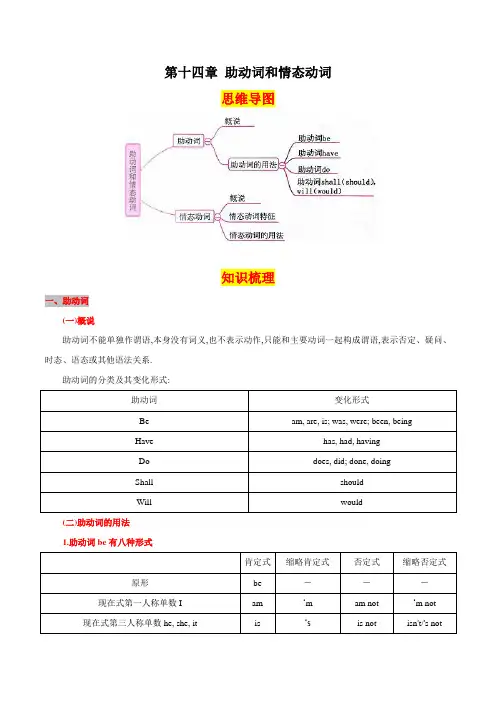
第十四章助动词和情态动词思维导图知识梳理一、助动词(一)概说助动词不能单独作谓语,本身没有词义,也不表示动作,只能和主要动词一起构成谓语,表示否定、疑问、时态、语态或其他语法关系.助动词的分类及其变化形式:(二)助动词的用法1.助动词be有八种形式(1)与现在分词构成各种进行时态以及与have和现在分词构成完成进行时态.You are working hard today.你们今天干得很努力.Is Su Ming working this week?本周苏明上班了吗?What have you been doing these days?这几天来你在干什么?(2)与过去分词构成被动语态.A new computer has been bought by the office.办公室已购买了一台新电脑.He was been invited to teach at a university there.他被邀请在那儿的一所大学任教.Such books are written for children.这种书是为儿童写的.(3)与形容词、名词、代词、从句等构成“系+表”结构.My job is very interesting and I like it very much. But sometimes it's boring.我的工作很有趣,我非常喜欢它,可有时候也令人烦.(4)与动词不定式构成谓语.The new text seems to be easy, but actually, it is rather difficult.这篇新课文好像很容易,其实相当难. These books are not to be taken out of the room.这些书不得带出室外.2.助动词have有五种形式(1)与过去分词构成各种完成时.We've known each other since 1987.我们从1987年起就互相熟悉了.He's been to Shanghai.他去过上海.We have not seen each other since I left Beijing.自从我离开北京,我们就没见过面.By the end of last month, we had studied English for two years.到上月底,我们已经学习了两年英语了.(2)和动词不定式连用构成谓语,表示因客观环境促使不得不做的事.The bus has left, and if we want to catch the train, we'll have to take a taxi.公交车开走了,假如想赶上那趟火车,我们不得不打的.点拨have还可用作实义动词,表示“有”“吃”等含义.Would you like to have some beer?你想喝点啤酒吗?We're having breakfast.我们正在吃早饭.3.助动词do有三种形式(1)构成一般现在时和一般过去时的疑问句.Do you know what they are talking about?你知道他们在谈论什么吗?What question did he ask you?他问你什么问题?(2)构成一般现在时和一般过去时的否定句.He doesn't want to go there, neither do they. 他不想去那儿,他们也不想.He didn't come to school last Monday.上星期一他没来上学.(3)代替前面刚出现的动词,以避免重复.-Do you learn English?你学习英语吗?-Yes, I do.是的,我学习英语.This material looks nice. So does that one.这料子看来很好.那种也很好.(4)用于加强语气,表示强调(多用于肯定式中).Do come and join us.一定要来参加我们的活动.I do think you are right.我的确认为你是对的.I do like you.我真的喜欢你.点拨do还可用作实义动词,表示“做、干”等含义.(1)They went out to do some shopping.他们外出买东西去了.(2)Would you please do me a favour?你愿帮我一个忙吗?4.助动词shall(过去式should)和will(过去式would)有下列几种形式(1)“shall/will+动词原形”,构成一般将来时,表示将来意义.shall用于单复数第一人称,will可用于所有人称.在今日英语中,shall常被will替代.Will you close the door, please?请关上门好吗?Shall I open the door? It's stuffy in the room.我打开门好吗?房间里很闷.When will Mike arrive here tomorrow?迈克明天什么时候到达这里?He will arrive here at three o'clock tomorrow.他明天三点钟到达这里.(2)“should/would+动词原形”,构成过去将来时.should作为“shall”的过去形式,用于单复数第一人称;would 作为“will”的过去式,可用于各人称.They said that they would finish it soon.他们说很快就要做完了.Did you ask Kate when they would return?你问没问凯特他们什么时候返回来?点拔will可表示某种倾向或习惯性动作The door won't shut.门关不上.Fish will die out of water.鱼离开水不能活.二、情态动词(一)概说情态动词表示说话人的语气和观点.情态动词有一定的词义,但不能单独作谓语,它必须和表示动作或状态的不带to的不定式(ought除外)连用,构成复合谓语.情态动词只有情态意义,即它表示说话人对动作的观点,如需要、可能、意愿或怀疑等.情态动词主要有:can(could),may(might),must, ought to, need, dare(dared), have to(had to).此外shall, will, should, would在一定场合下也可用作情态动词.(二)情态动词具有以下特征1.在形式上,情态动词没有实义动词的各种变化,只有could, would, had to, might, should等几个过去式.其他如must, ought to等的过去式皆与现在式同形,且在各种人称后都用同样的形式2.在意义上,大多数情态动词有多个意义.如can可表示“能够”“可能”“允许”等,may可表示“可能”“允许”“目的”“让步”等3.在用法上,情态动词(除ought跟不定式外)与助动词一样,须后接动词原形,而构成谓语动词(三)情态动词的用法1.can的用法(1)表示能力“会、能”等.The hall can hold at least 2000 people.这个大厅至少能容纳2000人.Can you drive a car?你会开车吗?点拨(1)can和be able to都可表示“能力”,意思上相同.但can只有现在式和过去式(could)两种形式,如需用其他时态,用be able to代替.He can still be alive.他可能还活着.He can't be poor.他不可能贫穷.He has not been able to finish the work in time.他没能及时完成工作.I'll be able to see you tomorrow,我明天将能去看你.(2)如果我们要表示一个动作成功地完成了,那么必须使用was able to,而不能用could.He was able to leave Europe before the war began.他设法在战前离开了欧洲.He was able to go to Paris yesterday and he enjoyed himself very much.他昨天设法去了巴黎,而且他玩得非常高兴.(3)在否定句中could与be able to两者意思一样.I could nor swim to the other side of the river.I wasn't able to swim to the other side of the river.我没能游到河的对岸去.(4)can/could不应与be able to同时使用.(2)表示“建议”或“请求”,可用can I...或can you...等结构,语气比较客气.Can I go swimming today, please, Mum?妈妈,我今天可以去游泳吗?Can I borrow your bike?我可以借你的自行车用一下吗?(3)表示惊异、怀疑、不相信等态度(主要用于否定句和疑问句).No, no, this can't be true.不,不,这不可能是真的.How can you be so careless?你怎么能这样粗心呢?(4)表示“允许”或“请求允许”,其意思相当于may(可以),但can比may用得更广泛,can不仅表示说话人同意、允许,还可表示客观条件的许可.may通常表示说话人的许可.No one can smoke in the office.在办公室里任何人都不能吸烟.That sort of thing can't go on like this.那样的事不能再这样继续下去.2.could的用法(1)could是can的过去式,表示过去有能力及过去存在的可能性.He couldn't go that day.那天他不可能去.(可能性)I could drive a car before I left school.毕业前我就会开车了.(能力)(2)用于现在时和将来时,代替can;表示更为客气、婉转地提出请求或陈述看法,有时则表示可能性不大.Could you tell me where I can change some money?你能告诉我在哪儿能换钱吗?Could you sign here please, Sir?先生,请在这儿签字好吗?3.may的用法(1)表示客气或委婉的请求时用may,回答时也用may就会显得冷淡、不客气,所以最好避之而改用热情、客气的答语.-May I come in?我可以进来吗?-Yes, please.可以,请进.-May I borrow your bicycle?我可以借用一下你的自行车吗?-Certainly.当然可以.(2)表示“可以”即表示说话人同意、许可,或在疑问句中,征询对方的许可.其否定式可用may not.但在表示“不可以”“不许”“禁止”“阻止”等意思时,常用must not(mustn't)代替may not.-May I take this book out of the reading-room?这本书我可以带出阅览室吗?-No, you mustn't.不可以.(3)表示可能.用来表示一件事或许会发生,或是某种情况可能会存在.通常只用于肯定或否定陈述句中,而不用于疑问句中.It may rain today.今天可能下雨.You may have another cake.你可以再吃一块蛋糕.She may not go to the concert tonight.今晚她可能不去听音乐会了.(4)表示祝愿.May you succeed!祝你成功!May all your dreams come true!愿你的理想都成为现实!4.might的用法(1)作为may的过去式,用来表示过去的“可能”和“允许”,多用于间接引语.He said that the news might be true.他说这消息可能是真的.She asked if she might have my bike.她问是否可以借用我的自行车.(2)代替may,表示可以做的事或可能发生的事.也可用于有礼貌地提出建议或请求,意为“可以”,在这种情况下,may和might无时间上的差别,只是更客气或更婉转些.They might have a lot of work to do.他们可能有很多事要做.Might I have a word with you?我可以同你说句话吗?5.must的用法(1)表示“必须”“应当”.用第一人称时,表示说话人认为有义务、有必要做某事.用第二、三人称时,表示说话人命令或要求别人做某事;在疑问句中,表示询问对方的意图.We must love our country.我们要爱国.I must take a day off tomorrow.我明天必须请假一天.Soldiers must obey orders.士兵必须服从命令.(2)must的否定式(mustn't)表示“不应该”“不许可”“不准”“禁止”等,语气比较强烈.You mustn't speak loudly in the library.不许在图书馆大声喧哗.We mustn't waste our time.我们不应该浪费我们的时间.点拨对must问句的否定回答,需要用;need not(needn't)不需要,或don't have to不必.-Must I do my homework now?我现在必须做作业吗?-Yes, you must.是的,你非做不可.-No, you needn't(need not)./don't have to.不,你不必现在做.(3)表示肯定的揣测(只用于肯定句):一定、准是、必定.The lady must be a doctor.那个女人一定是个医生.He hasn't come yet. He must be ill.他还没来,准是病了.Miss Gao must be in the office.高老师一定在办公室里.This must be Wang Hai's book.这一定是王海的书.点拨(1)表示现在对已发生过的事情的推测,一般用“must+have+过去分词”结构,意思是“想必是”“(过去)一定”.If you were at the party, you must have seen Mary.你如果参加了这次聚会,准保看见了玛丽.(2)表示对现在某个动作或即将发生的事情的推测,可以用“must be+ -in g”结构,意思是“一定”“准是”.You must be joking!你一定是在开玩笑!6.have to的用法(1)表示“不得不”“必须”的意思,与must在这个意思上很接近.must强调说话者的主观看法,意为“必须”;have to强调客观的需要,意为“不得不”.I missed the train, so I had to take a taxi.我误了火车,所以我得乘出租车.must仅用于表示现在和将来的义务,讲述过去,要用had to.I had to leave early because I wasn't feeling well.我不得不早点儿离开,因为我觉得不舒服.(2)have to也可用来表示“推测”,意思是“定是”“必定是”.She has to be(=must be) sick. She looks pale.她一定是生病了,脸色看来很苍白.点拨在口语中,可用have got to代替have to.Sorry I have got to go (=have to go) now.抱歉,我现在非走不可了.7.need的用法(1)need表示“需要”“必须”.作为情态动词主要用于否定句和疑问句,无时态、人称变化,后面跟动词原形.其否定式为:need not(needn't).You needn't try to explain.你不需要解释.She needn't come tomorrow.她明天不必来.点拨needn't后面跟“have+过去分词”结构,表示“过去已做了(但)没有必要做的事情”.The question needn't have been discussed.此问题本来不需讨论的.(2)need用作及物动词,主要用于肯定句,有人称、时态和数的变化,后接带to的不定式.其否定形式要借助于don't, doesn't或didn't;疑问形式要借助于do, does或did.He needs to know it.他需要知道这件事.Do you need any help?你需要帮助吗?I don't need things like that.我不需要那样的东西.8.dare的用法dare作为情态动词,主要用于否定句和疑问句,表示“敢于”,本身无变化(各人称都用dare),后面跟不带to的不定式,过去时用dared,其否定式为:dare not/daren't,dared not.How dare they do such a thing?他们怎么敢做出这样的事?Dare he say so?他敢这样说吗?She knows he was wrong but she daren't tell him.她知道他错了,却不敢告诉他.点拨dare用作及物动词的时候更多一些.这时dare后可以跟动词不定式,用于各种结构中.Do I dare to ask her?我敢问她吗?He didn't dare to go.他不敢去.She did not dare to tell them the truth.她不敢对他们说真话.9.ought to表示“应该”做某事,常可与should互换.You ought to be punctual.你应该守时.Students ought not to be late for class.学生上课不应该迟到.Ought we to answer this question now?我们应当现在就回答这个问题吗?点拨ought to后面跟“have+过去分词”结构,表示对过去该做而未做之事的责难、后悔或遗憾的心情.You ought to have helped her.你本该帮助她的.(却没有帮助她)He ought to have returned these books to the library last week.他上星期就应该把这些书还给图书馆.(却没有还书)10.shall的用法(1)shall作为情态动词,用于陈述句的第二、三人称,表示说话人的强烈意愿和决心,有“允诺”“警告”“命令”等含义,意思是“必须”.You shall come whenever you are wanted.什么时候叫你就要什么时候到.(强制)You shall not leave your post.你不得离开岗位.(警告)He shall get the answer tomorrow.他明天可以得到答复.(允诺)(2)shall作为情态动词,在疑问句中可用于第一、三人称,表示征询对方意见或请求,意思是“要不要”“好不好”.Shall he come to see you?要不要他来看你?Shall we go for walk?我们去散散步好吗?Shall I turn on the light?我要开灯吗?11.will的用法(1)表示“意志”“意愿”,可用于多种人称.He'll help you if you ask him.如果你请他帮忙,他是愿意帮忙的.Will you give him a message when you see him?见到他时,请你通知他一下好吗?(2)will还可用来表示一种习惯性动作或状态,有“总是”“惯于”等意思.Fish will die out of water.鱼儿离开水会死去.He will talk for hours if you give him the chance.如果你给他机会,他会滔滔不绝地谈上几个钟头.12.should的用法(1)表示“义务或责任”,意思是“应该”.I should speak and write English every day.我应该天天说、写英语.We should learn from each other and help each other.我们应该互相学习,互相帮助.(2)表示推测、预期.They should be here by now.他们现在该到了.Tom should know her address.估计汤姆知道她的住址.(3)should后面跟“have+过去分词”结构,其肯定句,表示过去应该做而未做的事,其否定句则表示过去不该做但做了的事情.He looks very tired. He should have had a good rest at home.他看上去很累了,本应该待在家里好好休息.As an adult, he shouldn't have misunderstood it.作为成人,他本来就不应该误解这件事.13.would(1)would作为情态动词will的过去式,表示过去时间的“意志”“愿望”或“决心”等,可用于各人称.I said I would do anything for him.我说过,我愿意为他做任何事.He said he would get up earlier the next morning.他说第二天早上要早点起床.(2)would可用来表示人的意愿、个人想法.在疑问句中用于第二人称,表示有礼貌、较婉转的请求.如:Would you like to have a glass of tea?你要喝一杯茶吗?Would you mind closing the door?请关上门好吗?I would like to buy a silk scarf for my wife.我想给妻子买一条丝巾.(3)would与动词连用,可表示过去反复发生的动作,相当于汉语中的“常常”“总是”等意思.如:The old retired worker would often go to the park to play chess.这位退休老工人常常到公园去下棋.When I was a student, I would take a walk along the country road after class.当学生时,放学后我常常沿着乡间小路散步.好题精练一、用适当的助动词和情态动词填空1.His father_________ not a lawyer.2.He_________ two sisters and a brother.3.I_________ never met him before I heard his speech.4.The visitors_________ given a warm welcome.5.Excuse me, _________ I have a look at the photo?6. _________ you work out(算出)this difficult problem without any help?7.This is a reading room. You_________ sing here.8. _________ I speak to the headmaster, please?9. _________ you like a sandwich?10.I_________ love a cup of tea.11.You_________ not drink and drive.12.We_________ buy a new lock for the front door.13.You_________ to knock at door before you come in.14.He_________ to pass an examination before he can start work.15. _________ you guess the answer? Sorry, I can't.16.May I come in? No, you_________.17.Your father is free now. You_________ ask him to tell you a story.18. _________ we hand in the exercises today?No, you needn't. You_________ hand them tomorrow.答案:1.is2.has3.had4.are5.may6.Can7.mustn't8.Could9.Would 10.would11.should 12.should 13.have 14.has 15.Can16.mustn't 17.may 18.Must,may二、选择填空1.-What_________ it be?-It_________ be a mail box, for it is moving. It_________ be a car.A. can; can't; mustB. can; can; mustC. can; mustn't; mustD. must; mustn't; can2.My mother is out. I_________ look after my little brother.A. have toB. canC. has toD. may not3.At that time she_________ sit here like that for hours.A. willB. wouldC. had toD. shall4.The radio says it is sunny today. You_________ take a raincoat with you.A. can'tB. needn'tC. mustn'tD. can5.I_________ like Chinese tea with nothing in it.A. wouldB. mustC. needD. can't6.- _________ we go out for a walk?-Good idea. What time shall we meet?A. ShallB. LetC. WillD. Must7.He_________ to go there when he was young.A. usedn'tB. didn't useC. is usedD. both A and B8.-Must we finish our homework now, Mrs. Read?-Oh no, you_________.A. mustn'tB. can'tC. won'tD. needn't9.These useful dictionaries_________ good care of.A. must takeB. must be takeC. must be takenD. must to take10.Don't be late again. You_________ be here on time.A. mustB. canC. mayD. needn't11.Tom,don't worry, you_________ get the book next morning.A. shallB. willC. mayD. can12. _________ you swim in the river?A. CanB. MustC. MayD. Need13.Chinese must have the largest number of speakers, _________?A. mustn't theyB. haven't theyC. don't theyD. doesn't it14.You did not go to the party yesterday, or I_________ you.A. would seeB. could meetC. might have seenD. might see15.-Is the boy by the window your brother?-It_________ him.A. maybeB. may beC. would beD. need be16.What_________ you like for breakfast?A. mayB. willC. wouldD. can17.- _________ you like some drink?-Yes, please.A. WouldB. WillC. CouldD. Can18.-May I throw a frisbee in the street?-No, you_________.A. may not B .mustn't C. needn't D. don't19.-Can you mend a TV set?-No, I_________.A. mustn'tB. can'tC. may notD. needn't20.-Please don't make a noise.-_________.I'll be as quiet as a mouse.A. Yes, I won'tB. No, I won'tC. No, I willD. Yes, I will21.The traffic_________ stop when lights are red.A. mustB. mayC. canD. mustn't22.- _________ I ask you a question, please?-Yes, please.A. MayB. MustC. NeedD. Will23.Go and ask Mr. Wu. He_________ tell you1 how to use the dictionary.A. mayB. shouldC. wouldD. could24. _________ you please tell me the way to the station?A. ShallB. WouldC. MayD. Might25. _________ I open the window? It's hot here.A. MustB. WillC. ShallD. Would 答案:1-5AABBA 6-10ADDCA11-15 BADCB 16-20 CABBB21-25 AAABC。
专项练习八助动词和情态动词专项练习八助动词和情态动词1. The doctor was Mrs. Gao when her students came to see her last Sunday.A. getting onB. holding onC. coming onD. looking over2. He often on Sunday.A. does a shoppingB. does any shoppingC. does some shoppingD. go shopping3. Because there is no light in the room, he be in.A. mustn’tB. can’tC. needn’tD. dare not4. –some more people to do the work?– Yes, I think so.A. Need we ask forB. Do we need to ask forC. Need we do ask forD. Do we need ask for5. – May I smoke here?– No, .A. you mustn’tB. you may notC. you’d better notD. all the three answers6. It’s very dangerous outside. You go out.A. had betterB. had better notC. hadn’t bett erD. had better not to7. – Must we finish the work today?– No, you . You may leave some to tomorrow.A. can’tB. mustn’tC. don’tD. needn’t8. He go there.A. dare notB. don’t dare toC. dares notD. does not dare9. you like to come to my party?A. ShallB. WouldC. ShouldD. Will10. –you play football with us?– Sorry, I . I tidy my room.A. Will; won’t; mustn’tB. Could; couldn’t; couldn’tC. Can; can’t; have toD. May; mayn’t; must11. When the lights are red, the traffic stop. Then you cross.A. must; canB. should; shouldC. have to; mustD. can; can12. She be good at both maths and English, she?A. must; mustn’tB. need; needn’tC. may not; mayD. can’t; can13. come in, please.A. WillB. DoC. Won’tD. Did14. – What it be?– It be a mail box, for it is moving. It be a car.A. can; can’t; mustB. can; can; mustC. can; mustn’tD. must; mustn’t; can15. My mother is out. I look after my little brother.A. have toB. canC. has toD. may not16. At that time she sit here like that for hours.A. willB. wouldC. had toD. shall17. The radio says it is sunny today. You take a raincoat withyou.A. can’tB. needn’tC. mustn’tD. can18. I like Chinese tea with nothing in it.A. wouldB. mustC. needD. can’t19. –we go out for a walk?– Good idea. What time shall we meet?A. ShallB. LetC. WillD. Must20. He to go there when he was young.A. usedn’tB. didn’t useC. is usedD. both A and B21. – Must we finish our homework now, Mrs. Read?– Oh no, you .A. mustn’tB. can’tC. won’tD. needn’t22. These useful dictionaries good care of.A. must takeB. must be takeC. must be takenD. must to take23. Tom, don’t worry, you get the book next morning.A. shallB. willC. mayD. can24. you swim in the river?A. CanB. MustC. MayD. needn’t25. Chinese must have the largest number of speakers, ?A. mustn’t theyB. haven’t theyC. don’t theyD. doesn’t they26. You did not go to the party yesterday, or I you.A. would seeB. could seeC. might have seenD. might see27. – Is the boy by the window your brother?– It him.A. maybeB. may beC. would beD. need be28. What you like for breakfast?A. mayC. wouldD. need be29. –you like some drink?– Yes, please.A. WouldB. WillC. CouldD. Can30. – May I throw a Frisbee in the street? – No, you .A. may notB. mustn’tC. needn’tD. don’t31. – Can you mend a TV set?– No, I .A. mustn’tB. can’tC. may notD. needn’t32. –Please don’t make a noise.–. I’ll be as quiet as a mouse.A. yes, I won’tB. No, I won’tC. No, I willD. Yes, I will33. The traffic stop when lights are red.A. mustB. mayD. mustn’t34. –I ask you a question, please?– Yes, please.A. MayB. MustC. NeedD. Will35. Go and ask Mr. Wu. He tell you how to use the dictionary.A. mayB. shouldC. wouldD. could36. you please tell me the way to the station?A. ShallB. WouldC. MayD. Might37. I open the window? It’s hot here.A. MustB. WillC. ShallD. Would38. –Who’s the man over there? Is it Mr. Li?– No, it be him. Mr. Li is much taller.A. mustn’tB. may notC. can’tD. needn’t39. – Write to me when you get home–.A. I mustB. I willC. I canD. I should40. “Must we hand in the papers now?”“No, you .”A. can’tB. may notC. mustn’tD. needn’t41. –I have your name please?– Yes. Smith. S-M-I-T-H.A. MustB. MayC. WillD. Need42. –I’m sorry. I didn’t win the game.–Well, that’s OK. You win every time.A. mustn’tB. may notC. can’tD. shouldn’t43. You swim in this part of the lake. It’s dangerous.A. mustn’tB. needn’tC. won’tD. can’t44. –It’s nearly six p. m., will you have supper here? – Sorry, . I have many things to do.A. I mustn’tB. I can’tC. I needn’tD. I don’t45. You can go to ask Mr. Yang. He know how to search the Internet.A. canB. mayC. wouldD. could46. – May I change the film here?– No you do that in the sunshine.A. needn’tB. wouldn’tC. don’t have toD. can’t47. – Where is Jack please?– He in the reading room.A. canB. needC. wouldD. must。
助动词与情态动词【1 】一.助动词助动词有be, have, do, will, shall.它们本身没有词义,只和实义动词的必定情势组成复合谓语,用来暗示时态和语态,组成否认.疑问及增强语气等.1.be (am, is, are, were, been)(l)“be+-ing”组成进行时态;(2)“be + 曩昔分词”组成自动语态;(3)“be + 动词不定式”组成复合谓语:①表按筹划安插要产生的事.The prime minister is to visit Japan next year.总理将于来岁拜访日本.②用于敕令.You're to do your homework before you watchTV.你得做完了功课才干看电视.2.have(has,had)(1)“have+曩昔分词”组成完成时态.如:Have you seen the film ?(2)“have been + -ing”组成完成进行时态.如:What have you been doing these days?这些日子你一向在干什么?3.do(does,did)(1)“do not + 动词本相”组成行动动词的否认式.如:His brother doesn’t like playing basket.;(2)“Do + 主语+ 动词本相”组成行动动词的一般疑问句.Does he go to school by bike every day?(3)“do + 动词本相”用于祈使句或陈述句中暗示增强语气.如:I did go to see him, but he wasn’t in我确切去探望他了,但他不在家.Do do some work. 请必定做点什么;(4)代替前面刚消失的动词以防止反复.My mother told me to go to bed early. So I did.4.will,shall(would,should)“will (shall+动词本相)”组成一般未来时,一般来说,shall用于第一人称,will用于第二人称或第三人称,白话中经常应用will代替shll,如:We will have a meeting to discuss the problem.二.情态动词情态动词暗示措辞人对某一动作或状况的立场,可以暗示“可能”.“可以”.“须要”.“必须”或“应当”等之意.情态动词没有人称和数的变更.但不克不及单独作谓语动词用,必须在厥后面接动词本相组成谓语动词.只有情态动词ought要和带to的动词不定式连用,在句中作谓语用. 将情态动词置于主语之前即组成其疑问式,在情态动词之后加not既组成其否认式.现将各情态动词的根本用法分述如下:1.can和could (could为can的曩昔式) 的根本用法(1)暗示才能,如:He can speak English better than you.(2)在疑问句和否认句中暗示“疑惑”.“猜测”或“可能性”,如:Can this greenbikebeLiuDong's?(3)暗示“许可”时can可以和may换用,如:You can (may) go home now.(4)假如要暗示语气悠扬,可用could代替can,这时could不再是can的曩昔式,如:Could you come again tomorrow?(5)can和be able to都可暗示才能,两者在意思上没有什么差别.但是can只能有如今式和曩昔式,而beableto则有更多的情势,如:He will be able todotheworkbetter.2.may和might (might为may的曩昔式)的根本用法(1)暗示许可或征询对方许可,有“可以”之意,如:You may use my dictionary. 在答复对方说“可以做某事”或“不成以做某事”时,一般多不必may或 maynot,以防止语气生硬或不容气.而用比较悠扬的说法进行答复.如:---- May I use this dictionary? ---- Yes, please. 或 ---- Certainly.在要求对方许可时,假如Might I…? 就比用May I…?语气更悠扬些,如:May I have a look at your new computer? 但是暗示“阻拦”或“制止”对方做某事时,要用must not代替may not,如:---- May we swim in this lake? ---- No, you mustn’t. It’s too dangerous.(2)may或might都可以暗示可能性,暗示“或许”.“可能”之意,假如用might暗示可能性,则语气加倍不确定,如:They may (might) be in the library now .3.must的根本用法(1)must暗示“必须”.“应当”之意,其否认式must not,缩写情势为mustn't,暗示“不该该”,“不准”.“不准可”或“制止”之意,如:We must study hard and make progress everyday.You mustn'ttouch the fire.(2)对以must提出的疑问句,如作否认答复时,要用needn't或用don't(doesn't)have to(不必)来答复,而不必mustn't,因为mustn't暗示的是“制止”或“不准可”之意,如:---- Must we finish the work tomorrow? ---- No, you needn't (don't have to), but you must finish it in three days.(3)在确定句中must可以暗示推想,暗示“必定”或“确定”之意,如:---- Whose new bike can itbe? ---- Itmustbe Liu Dong's.Iknow hisfatherhasjustboughthim a newone.4.can, could, may, must后接完成式的用法(1)can,could后接完成式的用法:①在否认句或疑问句中暗示对曩昔产生过的工作的“疑惑”或“不确定”的立场,Could he have said so?②在确定句中,可以暗示曩昔可能做到而现实并没做到的工作,有“奉劝”或“责怪”的语气.如:---- When did you answerherletter? ---- Only yesterday. ---- It'stoo late. You could have answered itearlier, I am sure.(2)may,might后接完成式的用法①暗示对曩昔某事的推想,以为某一件工作在曩昔可能产生了.假如应用might,语气就比较悠扬或加倍不确定,如:Mary might have learned some Chinese before.②可以暗示曩昔本来可以做到而实际没有做到的工作,有“奉劝”或“责怪”的语气,如:You didn't do the work well that day. You mighthavedone itbetter.(3)must后接完成式的用法:暗示对曩昔某事的推想,以为某事在曩昔必定做到了,如:Liu Dong isn’t in the classroom. He must have gone to the library.5.have to 的根本用法:have to和must的意义邻近,只是must着重暗示措辞人的主不雅看法,而have to 则暗示客不雅须要,如:I must study hard. I had to giveitup becau搜刮引擎优化f illness.6.ought to的根本用法(1)暗示依据某种责任或须要“应当”做某事,语气比should强,例如:Everyone ought to obey the traffic regulations.(2)暗示推想,留意与must暗示推想时的差别:He must be home by now .(判断他已到家),He ought to be home by now .(不十分确定),This is where theoilmustbe.(比较直爽) ,This is where the oil ought to be. (比较含蓄);(3)“ought + have+ 曩昔分词”暗示曩昔应做某事而现实未做.例如:You ought to have helped him. (but you didn’t)这时,ought与 should可以互相换用.留意,在美国英语中ought to 用于否认和疑问句时to可以省略.例如:Ought yousmokesomuch? You oughtn’t smoke so much.7.dare的根本用法(1)dare(dared为其曩昔式) 作情态动词用时,重要用于否认句,疑问句和前提从句中,如:Daredhe bread the traffic regulations again?(2)在现代英语中dare经常应用作行动动词,其变更与一般行动动词雷同,如:She dares to stay at home alone at night.8.need的根本用法(1)need作情态动词用时,重要用于否认句和疑问句中,如:He needn't worry aboutusnow.(2)need也可作为行动动词用,可用于确定句,否认句和疑问句中,厥后可接名词.代词.动名词或带 to 的动词不定式为其宾语.如:You need to practise reading aloud every day.(3)needn't后接完成式可以暗示曩昔做了一件本来不须要做的工作,如:---- Did you answer the letter yesterday? ---- Yes, I did. ---- But you needn’t have answered it.9.shall的根本用法(1)shall用作情态动词时,用于第二.三人称,暗示说活人的意愿,可暗示“敕令”.“警告”.“强迫”.“威逼”或“承诺”等意,如:He shall go first, whether he wants to or not.(2)在疑问句中,shall用于第一.三人称,暗示措辞人的征询对方看法或要求指导,如:Shall I open the door?10.should的根本用法(1)should作为情态动词可以暗示“建议”或“奉劝”,有“应当”之意,如:You should learn from each other.(2)should后接完成式暗示曩昔没有做到本来应当做的工作,或是做了本来不该该做的工作.如:You should have give him more help.11.will的根本用法(1)用于大家称,可以暗示“意志”或“决心”,如:I have told him again and again to stop smoking,buthe willnotlisten.(2)在疑问句顶用于第二人称,暗示措辞人向对方提出要求或讯问对方的意愿,如:Will you please tellme how to getto the CapitalGymnasium?(3)will可以暗示一种习惯性的动作,有“老是”或“会要”之意,如:Every morning he will have a walk along this river.12.would的根本用法(1)would作为will的曩昔式,可用于大家称,暗示曩昔时光的“意志”或“决心”,如:Hepromised he would neversmoke again.(2)在疑问句中,用于第二人称,暗示措辞人向对方提出要求或许问对方的意愿时,比用will的气加倍悠扬,如:Would you like some more coffee?(3)在日常生涯中,学用“I would like to…”暗示“我想要”或“我同意”之意,以使语气悠扬,如:I would like to do Ex.2 first.(4)would可以暗示曩昔的习惯动作,比used to正式,并没有“现已无此习惯”的寄义.如:Last year our English teacher would sometimes tell us stories in English after class. / During the vacation he would visit me every week.(5)表猜想或猜测,如:It would be about ten when he lefthome./ Whatwould she be doing there?/ I thought he would have told you about it.演习题1. If they _________ to do this work, he might do it some other way.A. wereB. shouldC. willD. can2. I was told yesterday that the company _________ me to Rome nextweek for a business conference.A. should have sentB. were going to sendC. should be sendingD. should send3. Let's take a walk, ________? A. will we B. don't we C.do we D. shall we4. He was a good swimmer so he _________ swim to the river bankwhen the boat sank.A. couldB. mightC. shouldD. was able to5. I went to the doctor's yesterday, I had to wait for half an hourbefore he ________ see me.A. canB. mayC. mightD. could6. ---- _________ this book be yours? ---- No, it ________ not be mine. It ________ be his., might, mustC.Can, may, must D.Must, can, may7. "We didn't see him at the lecture yesterday. " "He _________ it. "A. mustn't attendB. can't have attendedC. would have not attendedD. needed have attended8. They _________ the plane, or perhaps they have been preventedfrom coming for some reason.A. can have missedB. may have missedC. can have lostD. may have lost9. Since the ground is white,it _________ last night.A. had snowedB. must have snowedC. must be snowingD. must have been snowing10. You must be fifty, ________?A. mustn't youB. needn't youC. aren't youD.mnyn'tyou11.You must have seen him off yesterday, _________?A. haven't youB. didn't youC. mustn't youD. needn't you12. ---- That must be a mistake. ---- No .it_________be.A. can'tB. isn't able toC. canD. was able to13. He had known the matter before you told him, so you _________ have told it to him.A. mustn'tB. can'tC. needn'tD. shouldn't14. How ________ so?A. dare you to sayB. dare you sayC. do you dare sayD. dare to say15. You are their teacher. You _________ care of them.A. should to takeB. might to takeC. ought to takeD. need to take16. She is studying medical science now but she _________ a lawyer.A. used to beB. would beC. wereD. had been17. If you were in an English-speaking country, you, too, _________English every day.A. will be used to speakB. will be used to speakingC. must be used to speakD. would be used to speaking18. I did not call to make my airline reservation (预订) but I _________.A. should have B, may have C. must have D. shall have19. As a girl, she _________ get up at six every day.A. wouldB. willC. mightD. should20. Don't you remember that we _________ to the cinema tonight?A. would goB. goC. are goingD. will be gone参考答案:语法温习十一:助动词与情态动词1~5 ABDDD 6~10 CBBBC 11~15 BACBC 16~20 ADAAC 21~25 ACBBB 26~30 ABBCC 31~35 DDBAB 36~40 ADBAA。
小学生英语助动词do、Are动词、情态动词的用法练习助动词(do)、动词(be)和情态动词(modal verbs)是研究英语的基础知识点。
在这份练文档中,我们将研究这些动词的用法。
一、助动词(do)的用法1. do作为助动词主要用于构成否定句和疑问句。
例如:- He does not like ice cream.(他不喜欢冰淇淋。
)- Do you like pizza?(你喜欢比萨吗?)2. do还可以用来表示强调。
例如:- I do love playing soccer.(我真的很喜欢踢足球。
)二、动词(be)的用法1. 用于表示存在、状态和身份。
例如:- I am a student.(我是一个学生。
)- They are at the park.(他们在公园。
)2. 动词(be)也可以用于构成进行时态。
例如:- She is studying English.(她正在学英语。
)三、情态动词(modal verbs)的用法1. can用来表示能力、许可和可能性。
例如:- I can run very fast.(我跑得很快。
)- Can I go to the bathroom?(我可以去上厕所吗?)2. must用来表示必须和推测。
例如:- You must finish your homework before you watch TV.(你必须先完成作业,然后才能看电视。
)- She must be tired because she stayed up late.(她一定很累,因为她熬夜了。
)3. should用来表示建议和义务。
例如:- You should eat more fruits and vegetables.(你应该多吃水果和蔬菜。
)- We should help others in need.(我们应该帮助需要帮助的人。
)四、练题1. 请用do的正确形式填空:I ___ my homework every day.2. 把下面的句子改成否定句:She likes swimming.3. 请用can的正确形式填空:He ___ speak English fluently.4. 把下面的句子改成一般疑问句:They are students.5. 请用should的正确形式填空:We ___ be kind to others.答案:1. do2. She does not like swimming.3. can4. Are they students?5. should希望这份练习能够帮助你巩固助动词(do)、动词(be)和情态动词(modal verbs)的用法。
英语助动词和情态动词及练习一、概述不同的时态(一般式、进形式、完成式、将来式),不同的语态(主动、被动),不同的语气(祈使、陈述、虚拟),不同的结构(肯定、否定、疑问),以及说话者本身的态度或命令、请求、愿望、可能等,所有这些都要借助于助动词和情态动词表达出来。
助动词一般没有词意,不能单独作谓语动词,除非省略句中。
他们只参加时态、语态、语气或否定、疑问结构。
情态动词有词义,可以用来表示说话者的语气和态度。
主要的助动词和情态动词如下表:二、助动词助动词一般没有词意,不能单独作谓语动词。
其作用在于帮助构成各种时态、语态、否定、疑问等。
1、助动词be(am, is, are, was, were, being, been)的用法(1) be后跟现在分词构成进行时态。
Who is playing the violin?谁在拉小提琴?She was reading a book then.那时她正在读书。
(2)be后跟过去分词构成被动语态。
He was asked to do the work.有人要他干这件工作。
You are invited to attend the meetintg.有人邀请你参加会议。
(3)be 后跟不定式作谓语,有如下几种情况:①表示计划、安排将要发生的事。
Who are we to meet?我们要见谁呀?I'm to have supper with John this afternoon.今天下午我要与约翰一起吃晚饭。
②表示指示、命令,否定式表禁止。
You are to see the headmaster today.今天你必须去见校长。
You are not to enter the room without permission.未经允许你不能进入房间。
③表示义务、责任等,同should。
You are to be back before 5.你得在5点钟以前回来。
What is to be done?该干什么。
④表示可能性,与情态动词may, can同义。
Such books are to be found in any library.这种书任何图书馆都有。
Not a sound was to be heard.一点声响也没有。
⑤表示后来发生的事,可以用来表示命运或注定They say good-bye, little knowing that they were never to meet again.他们告别了,没想到再也不能相见了。
He was to regret the decision.他有一天会后悔做出这一决定的。
⑥用于习语Where am I to go? 我该向何处去?What am I to do? 我该怎么办?2、助动词have(has, had, having)的用法(1)助动词have可以构成完成时或完成进行时He has been a doctor for 10 years.他当医生十年了。
This is the place I have been longing to visit.这就是我一直渴望参观的地方。
(2)和不定式构成谓语,表示客观上不得不做的事情。
We've missed the train. We'll have to wait for another one.我们己经误了火车,我们只能等下一列。
-Do we have to start work?我们得立刻工作吗?-No. We don't have to.不,不必了。
3、do(does, did) 的用法(1)构成疑问句或否定句How did you know about it?你是怎样知道这件事的。
He does not smoke. 他不抽烟。
(2)加强语气。
He did tell that.他的确告诉了此事。
Do come and see us.一定来看我们。
(3)代替前面刚出现的动词,避免重复。
-You like popular music, don't you?你喜欢流行音乐,是吧?-Yes , I do.是的,我喜欢。
He speaks French as fluently as she does.他讲法语和她讲的一样流利。
(4)用于倒装句中。
Never did he pay attention to my words.他从不注意我的话。
Only then did I understand the importance of English.只是那时,我才了解到英语的重要性。
(5)构成否定的祈使句。
Don't be so careless.不要那么粗心。
Do not hesitate to come for help.只管来求助。
4、shall(should)和will(would) 的用法(1)shall(should)用于第一人称的将来时中,单纯表示来I shall think it over.我要好好考虑一下。
When shall I see you again?我何时再见到你?I rang up to tell her that I should leave for London. 我打电话告诉她我要去伦敦。
(2)will用于第二、第三人称的将来时态中,在现代英语中可以用于所有人称He will be 30 next month. 他下月将是30岁。
You will have an English test tomorrow.明天你有英语小测验。
He wanted to know when you would finish the writing.他想知道你何时完成写作。
三、情态动词1、情态动词的特征情态动词表示说话人对某一动作或状态的态度,认为“可能、应当、必要”等等,但本身意义不完全,不能单独作谓语,必须和其他动词一起构成谓语。
除ought, used, have后跟不定式外,其他情态动词一律跟动词原形。
情态动词主要有:can/could, may/might, must, ought to, used to, need, dare, shall/should, will/would, have to等。
2、情态动词的变化形式(1)没有人称和数的变化。
I can /we can/ you can he can/she can/they can/it canJohnny, you mustn’t play with the knife, you may hurt yourself.约翰,你不能玩刀,那可能会伤着你。
A left luggage office is a place where bags can be left for a short time, especially at a railway station.行李寄存处特别是在火车站短时间存放包的地方。
He ought to know her address.他该知道她的地址。
(2)大部分情态动词有过去式:can-could may-might need-needed dare-dared shall-should will-would– Is John coming by train?约翰坐火车来吗?– He should, but he may not. He likes driving his car.应该是,他有可能不乘坐火车。
他喜欢开车。
- Are you coming to Jeff's party?你来参加Jeff的聚会吗?- I'm not sure. I might go to the concert instead. 我不敢肯定,我可能去参加音乐会。
(3)少部分情态动词没过去式或者说过去式与原形相同,used to 只有过去式形式。
must-must(had to) ought to -ought toI used to go there.我(以前)常到那里去。
You must be tired after your long journey. 你走了这么远的路,一定很累。
(4)大多数情态动词后面还可跟动词的进行时、完成时和被动式形式:can/may/must+ be doing/have done/be doneshould/would/might+be doing/have done/be doneHe must have earned a large sum of money.他一定是挣了一笔巨款。
You mustn’t always be talking so much.你不能总是说起来没完没了。
3、否定式和疑问式情态动词的否定式和疑问式同助动词。
否定式是在情态动词后加not;疑问式是将情态动词提前到主语的前面。
-Will you stay for lunch? 你留下来吃午饭好吗?-Sorry, I can’t. My brother is coming to see me. 对不起,我不能(留下来吃午饭),我兄弟要来看我。
May I ask you a question?我可以问你一个问题吗?I was really anxious about you. You shouldn’t have left home without a word. 你真急死我了。
你不该一句话也不说就离开家。
注意:have to 的疑问和否定是借助于do来构成。
Do you have to go out today?今天你得出去吗?He doesn’t have to go.他没必要去。
四、情态动词的基本用法1、can和could(1)表能力①意为“能够会”,表示体力或脑力等方面的能力Some of us can use the computer now , but we couldn't ten years ago.现在我们一些人能用计算机了,但十年前我们不能。
Can you ride a bike?你能骑自行车吗?What can I do for you?我能为你做点什么?I could run faster then. 我那时能跑得更快一些。
②当can和could表示能力时,有时可以用be able to替换,could表过去,can表现在,有时也可表将来,但不能与will, shall等助动词连用;be able to可以用于将来、完成等时态。
She hasn't been able t o come to school for three days.她已经三天没能来上学了。